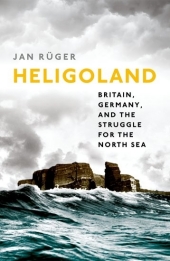 Neuerscheinungen 2017Stand: 2020-02-01 |
Schnellsuche
ISBN/Stichwort/Autor
|
Herderstraße 10
10625 Berlin
Tel.: 030 315 714 16
Fax 030 315 714 14
info@buchspektrum.de |

Jan Rüger
Heligoland
Britain, Germany, and the Struggle for the North Sea, Shortlisted for the 2018 Wolfson History Prize
2017. 384 S. 29 black & white illustrations, 1 map. 234 mm
Verlag/Jahr: OXFORD UNIVERSITY PRESS 2017
ISBN: 0-19-967246-6 (0199672466)
Neue ISBN: 978-0-19-967246-2 (9780199672462)
Preis und Lieferzeit: Bitte klicken
SHORTLISTED FOR THE 2018 WOLFSON HISTORY PRIZE
The story of Heligoland, the North Sea island which for generations stood as a symbol of Anglo-German conflict. A fascinating microcosm of a long and often troubled relationship, covering two centuries and two world wars.
On 18 April 1947, British forces set off the largest non-nuclear explosion in history. The target was a small island in the North Sea, thirty miles off the German coast, which for generations had stood as a symbol of Anglo-German conflict: Heligoland.
A long tradition of rivalry was to come to an end here, in the ruins of Hitler´s island fortress. Pressed as to why it was not prepared to give Heligoland back, the British government declared that the island represented everything that was wrong with the Germans: ´If any tradition was worth breaking, and if any sentiment was worth changing, then the German sentiment about Heligoland was such a one´.
Drawing on a wide range of archival material, Jan Rüger explores how Britain and Germany have collided and collaborated in this North Sea enclave. For much of the nineteenth century, this was Britain´s smallest colony, an inconvenient and notoriously discontented outpost at the edge of Europe. Situated at the fault line between imperial and national histories, the island became a metaphor for Anglo-German rivalry once Germany acquired it in 1890. Turned into a naval stronghold under the
Kaiser and again under Hitler, it was fought over in both world wars. Heavy bombardment by the Allies reduced it to ruins, until the Royal Navy re-took it in May 1945. Returned to West Germany in 1952, it became a showpiece of reconciliation, but one that continues to bear the scars of the twentiethcentury.
Tracing this rich history of contact and conflict from the Napoleonic Wars to the Cold War, Heligoland brings to life a fascinating microcosm of the Anglo-German relationship. For generations this cliff-bound island expressed a German will to bully and battle Britain; and it mirrored a British determination to prevent Germany from establishing hegemony on the Continent. Caught in between were the Heligolanders and those involved with them: spies and smugglers, poets and painters,
sailors and soldiers.
Heligoland is the compelling story of a relationship which has defined modern Europe.
The breadth of research - from areas as diverse as music, art, and literature, to naval planning and Nazi propaganda - is impressive, as is the authors skill in selecting what to leave out in what might easily have become an unwieldy study. Heligoland is a valuable addition to the literature to Anglo-German affairs since 1800, and one which - due to its inclusivity and breadth- will be of interest to all scholars interested in either country or indeed the history of Europe, in that period. David Morgan-Owen, 20th Century British History


